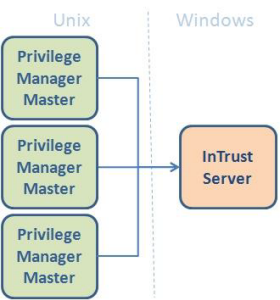Use the pmlogadm program to perform backup or archive operations on a policy server's event log database. Because Privilege Manager for Unix stores keystroke logs in individual flat files on the policy server, you may use standard Unix commands to back up or archive them. Make sure the keystroke log files are not associated with active sessions prior to backup or archive.
Disabling and enabling services
While pmlogadm can perform the backup and archive operations on a live event log database, for best results we recommend that you follow these steps prior to performing a backup or archive.
-
Stop the pmserviced and pmlogsrvd services.
Example: Disabling services on Redhat Linux systems:
# service pmserviced stop Stopping pmserviced service: done # service pmlogsrvd stop Stopping pmlogsrvd service: done
-
Ensure there are no running pmmasterd processes:
# ps -ef | grep pmmasterd
A running pmmasterd process indicates that there may be an active Privilege Manager for Unix session.
This procedure also allows you to safely backup or archive any keystroke log files. Once the backup or archive operation has completed, remember to restart the pmserviced and pmlogsrvd services.
This example shows how to restart the services on Redhat Linux systems:
# service pmlogsrvd start Starting pmlogsrvd service: done # service pmserviced start Starting pmserviced service: done
Backing up event logs
The pmlogadm backup command creates a clean backup copy of your event log database.
This example performs a backup of the current event log database, placing the copy in the /backup directory:
# pmlogadm backup /var/opt/quest/qpm4u/pmevents.db /backup 5 / 208 pages complete 10 / 208 pages complete ... 205 / 208 pages complete 208 / 208 pages complete
Backing up keystroke logs
Privilege Manager for Unix stores the keystroke logs in individual files and do not require any special commands for processing.
This example uses the unix cp command to recursively copy the keystroke logs to the /backup directory:
# cp -r /var/opt/quest/qpm4u/iolog /backup
Archiving event logs
The pmlogadm archive command creates an archive of old event logs and removes the old event logs from the current database. The following example archives logs for all events that occurred before April 1, 2014 from the current event log database, creating an archive database in the /archive/2014Q1 directory.
If you omit the --no-zip option, pmlogadm also creates a tar-gzip'ed archive of the database files.
# pmlogadm archive /var/opt/quest/qpm4u/pmevents.db 2014Q1 \
--dest-dir /archive --no-zip --before "2014-04-01 00:00:00"
Archive Job Summary
Source Log : /var/opt/quest/qpm4u/pmevents.db
Archive Name : 2014Q1
Destination Dir : /archive
Zip Archive : No
Cut off time : 2014/04/01 00:00:00
No pmlogsrvd pid file found, assuming service is not running.
X events will be archived.
Adding events to the archive.
Verifying archive.
Archive verification completed successfully. Removing events from source log.
Archive task complete.
Archiving keystroke logs
You can use the pmlog command with some carefully chosen options to get a list of keystroke logs associated with the event logs you archive. In this example, you process the list generated by pmlog, with the Unix xargs and mv commands to move the keystroke logs into the /archive/2014Q1/iolog directory.
# mkdir /archive/2014Q1/iolog
# pmlog -f /archive/2014Q1/archive.db \
-c "defined iolog && length(iolog) != 0" -p iolog \
| xargs -i{} mv {} /archive/2014Q1/iolog
The usage of the xargs command may differ depending on your platform.


